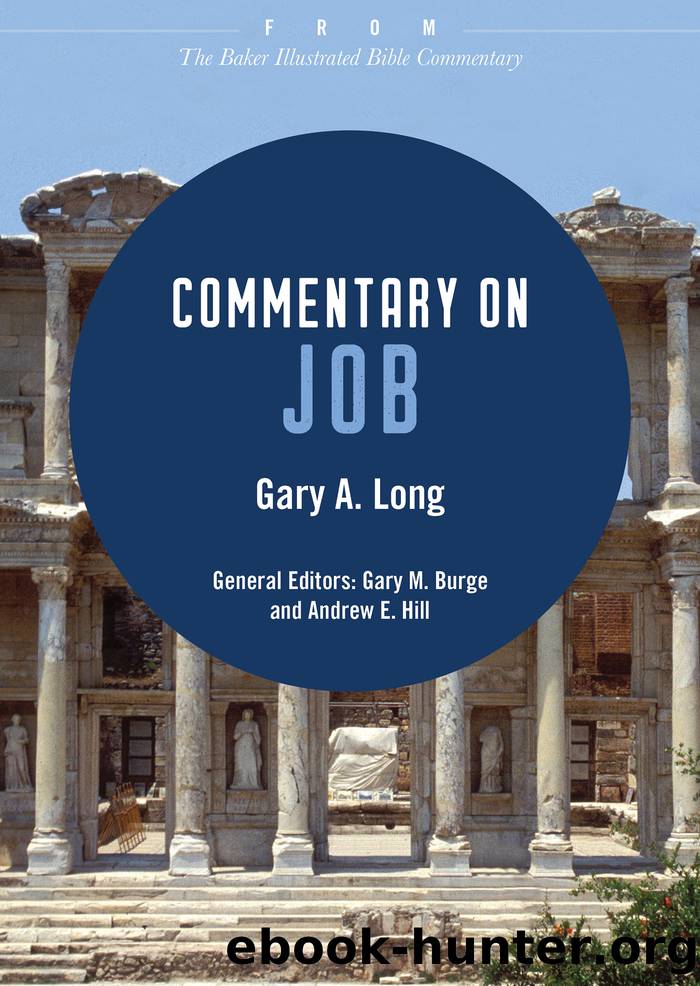Commentary on Job by Gary A. Long

Author:Gary A. Long [Burge, Gary M. and Andrew E. Hill]
Language: eng
Format: epub
Tags: Bible Commentary/Old Testament, REL006050, REL006060
ISBN: 9781493424528
Publisher: Baker Publishing Group
Published: 2019-10-24T00:00:00+00:00
Papyrus plants commonly grew in marshes along the Nile (cf. Job 8:11), as illustrated in this Egyptian painting of a hunt (tomb of Nebamun, ca. 1350 BC). [Copyright © Baker Photo Archive. Courtesy of the British Museum.]
8:8â10. Eliphaz was the first to appeal to experience, primarily his own (4:8, 12â21; 5:27). Having heard Eliphaz draw on personal experience and having seen Job remain unimpressed, Bildad implores Job to heed experience based on long-standing ancestral tradition. He may well have in mind even the primordial (Deut. 4:32). Job must pay attention to the ages.
8:11â19. This section is not without its interpretive hurdles. What is clear is that Bildad first draws on the image of a withering, water-starved papyrus plant to illustrate the outcome for the impious (8:11â13). But does the next plant imagery (8:16â19) offer a second illustration of the plight of the wicked (Clines 1989, 209â10) or a contrast with the first, describing the enduring nature of the blameless despite a harsh environment (Gordis 1978, 521; Newsom 1996, 402â3)? In favor of the latter is a textual environment where Bildad is contrasting fates (8:4, 20â22). Contrasting the blameless and the wicked with tree imagery is used in Psalm 1 and Jeremiah 17:5â8. Verse 19, an extremely abstruse verse, must be saying, for this interpretation, that the plant survives: âsuch is the plantâs joy, that from the dust later it will sprout.â The ambiguity of the Hebrew text allows for this. The NIV understands the imagery as a second illustration of the wicked. Though the wicked appear at times to thrive in good conditions (8:16) or when otherwise they should not (8:17), they will be uprooted (8:18) and the area overgrown with other, desirable plants (8:19). If this second interpretation is correct, Bildad seems to have aspects of Jobâs life in mind. Wealth and prestige were but for a season. Children are now uprooted, and Job himself will likely be uprooted if he does not return to God.
8:20â22. Here Bildad clearly articulates what his rhetorical questions had in mind in Job 8:3: God does not reject the blameless or strengthen the evildoer. Echoing his earlier plea to call on God to correct the wrong (8:5â7), Bildad, in traditional psalmlike rhetoric and categories, addresses Job directly and again affirms the possibility of a bright, restored future with enemies gone.
18:1â21: Second cycle. Bildad continues to dislike what heâs been hearing. He finds Job insulting. Bildad, with rich imagery, hammers his point that the wicked receive the judgment they deserve.
18:1â4. Bildad, having opened his first speech with âHow long?â (8:2), begins his second speech with a similar but more emotive form: âHow much more must we listen to insulting speechifying?â Bildad feels belittled by Jobâs persistent responses and is sure that Job considers his friends stupid. Bildad addresses Job not with Hebrew second-person singular forms but with plural, a one-time anomaly hereâall the friends elsewhere use the singular when they talk directly to Job. Clines lists no fewer than eleven possibilities for this phenomenon (Clines 1989, 409â10).
Download
This site does not store any files on its server. We only index and link to content provided by other sites. Please contact the content providers to delete copyright contents if any and email us, we'll remove relevant links or contents immediately.
Fangirl by Rainbow Rowell(9220)
How to Bang a Billionaire by Alexis Hall(8133)
Wonder by R. J. Palacio(8095)
The Thirst by Nesbo Jo(6921)
The Space Between by Michelle L. Teichman(6921)
Assassin’s Fate by Robin Hobb(6191)
Wiseguy by Nicholas Pileggi(5757)
The Night Circus by Erin Morgenstern(5207)
Paper Towns by Green John(5171)
The Kite Runner by Khaled Hosseini(5159)
Bittersweet (True North #1) by Sarina Bowen(4840)
Gerald's Game by Stephen King(4631)
Too Much and Not the Mood by Durga Chew-Bose(4324)
Pillow Thoughts by Courtney Peppernell(4266)
Goodbye Paradise(3795)
Twelve Days of Christmas by Debbie Macomber(3549)
Good by S. Walden(3543)
The Rosie Effect by Graeme Simsion(3453)
The Cellar by Natasha Preston(3328)
